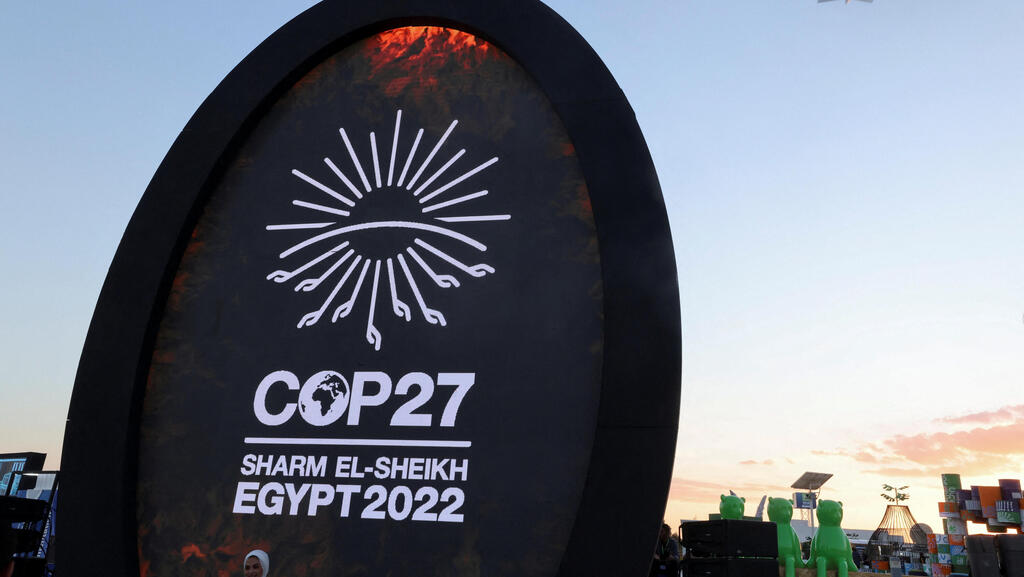
OECD report: countries not meeting climate goals, Israel at especially high risk
A dire report by the OECD ahead of the UN Climate Conference in Dubai says that most countries are not meeting the greenhouse gas reduction goals they committed to, including Israel, whose risk for temperature increase and other adverse effects of climate change like drought is among the highest in the world.
Israel ranks third after Saudi Arabia and India for the highest risk of exposure to temperature increase in the coming decades, according to a dire report released by the OECD two weeks before the opening of the UN Climate Conference in Dubai, on the climate crisis and its implications. The OECD’s Climate Action Monitor 2023 points to the significant gap between climate commitments by the international community and the actual situation, warning of the increased vulnerability to several countries, including Israel, if humanity fails to reduce its greenhouse gas emissions.
There has been a sharp increase in the percentage of the population exposed to life-threatening extreme temperatures among OECD partners and member states, rising from 24% in 1979 to 46% in 2022. This leads to worsened agricultural conditions, with an average decrease of 2.4% in soil moisture and a 48% increase in the exposure of built-up areas to coastal flooding in the last 20 years. The countries with the highest exposure to hot days in the years 2018-2022 are Saudi Arabia with 98.3% of its population exposed, India at 97.3%, and Israel at 91%. Although historical exposure to extreme temperatures in countries like Saudi Arabia and Israel was already high, the length of exposure has continued to increase over the years. The organization also points out that among OECD countries, Israel, Mexico, and Portugal have the highest percentage of forests at risk of wildfires.
According to the report, even under a moderate greenhouse gas emissions scenario, from 2080-2099, Israelis are expected to be exposed to approximately 80 days per year with maximum temperatures exceeding 35 degrees Celsius. This ranks Israel as the third-highest among all examined countries. This exposure is an increase of about 45 days per person, or nearly double the amount, on average compared to the years 1995-2014. This increase is the highest among all OECD countries and partner countries examined.
Related articles:
- Dubai Climate Conference: Israeli delegation will be significantly reduced, PM and ministers will not attend
- Creation-Space has raised $1 million for SpaceTech and fighting climate change
- "When Greta addresses the Israel-Hamas war superficially and dismissively, it inevitably weakens the validity of her climate-related positions"
Additionally, nighttime temperatures are also projected to increase significantly. In the years 2080-2099, Israelis are expected to be exposed to approximately 145 nights where the temperature does not drop below 20 degrees Celsius. This represents an increase of about 48 nights per year per person compared to the average between 1995-2014. This increase is the second-highest among the countries in the study. Hot nights, especially during an extended period, contribute significantly to heat stroke, the development of urban heat islands, and a rise in mortality rates. Israel is also the highest among all examined countries regarding the risk of drought, which has also severely increased over the same period.
To prevent a temperature rise of more than 1.5 degrees Celsius by the end of the century, which could have devastating consequences on the fabric of human life and the global economy, countries worldwide need to reduce greenhouse gas emissions by 43% (primarily from burning coal, oil, and gas). However, the 22 OECD countries committed only to a 28% reduction, and eight partner countries committed to a 5% reduction compared to their emissions in 2020. Countries need to increase their emission reduction targets by at least an additional 30% cumulatively to achieve the required reduction and bridge the gap between the leaders' rhetoric and actual actions.
According to the OECD report, as climate-related extreme weather events become more severe, the impact is growing including the financial toll. In 2022, economic loss due to natural disasters amounted to $270 billion, and insured losses were estimated to be $120 billion - the highest ever recorded. Last year, about 70,000 people lost their lives due to natural disasters, affecting approximately 185 million people worldwide. According to projections released this year, if the world continues on its current emission path, the global GDP may decrease by 10% by 2050. If no action is taken to preserve the environment and temperatures continue to rise by 3.2 degrees Celsius by 2050, as is now expected, the global GDP may decline even further – by 18%.
The OECD emphasizes in the report that investments in climate adaptation measures are usually significantly cheaper than dealing with the loss and damages from extreme weather events. Yet, while the Israeli economy may also face significant consequences of neglecting climate policy, the government is currently considering canceling or postponing climate programs to which they recently committed.
Despite Israel's need to prepare for inevitable climate changes to protect its population and reduce its greenhouse gas emissions as part of the global effort, Israel’s greenhouse gas emissions have increased, and climate budget allocations are now at risk due to the ongoing war against Hamas. The budget for the Ministry of Environmental Protection in 2023, under Minister Idit Silman, stands at NIS 384 million ($103 billion), compared to NIS 429 million ($115 billion) in 2022. It should be noted that despite Israel's small size, it emits greenhouse gasses similar to a medium-sized country.
Many of the Environmental Protection Ministry’s projects have been frozen, and some are now at risk of cancellation due to the need to allocate funds to meet coalition demands and the budget gap created by the war. For example, climate projects that were set to be launched regarding industrial energy efficiency and solar coverage are now at risk. The Ministry of Environmental Protection stated: "The ongoing activities of the ministry have not been affected, and there have been no changes. In accordance with the Ministry of Finance’s directive to all government bodies not to advance expenses that are not directly related to their functioning, the Ministry of Environmental Protection is currently examining the implications for various projects and engaging in discussions with the Finance Ministry on this matter."
In 2023, the impacts of climate change were dramatically felt worldwide, and according to estimates, 2023 is expected to end as the hottest year since global temperature measurements began. Unprecedented surface temperatures led to extreme weather events globally every month. Heatwaves, wildfires, floods, and hurricanes ravaged many countries, causing loss of life and livelihoods for many. However, these events have not been enough to align the international community with the goals they committed to in the last decade. According to the report, national climate policies in the countries responsible for almost two-thirds of total greenhouse gas emissions, increased by only 1% in 2022. This is the lowest annual growth recorded since 2000, indicating a significant slowdown in meeting the temperature goals of the Paris Agreement.
The OECD’s report analyzes and compares actions, needs, and expectations for climate crisis preparedness by member states and partner countries. According to the report, which examines the climate policies and actions of 51 countries, although 2022 saw a significant slowdown in climate action, national climate policy actions increased by an average of 10% per year between 2000 and 2021. While the adoption of market-based policy tools has slowed, government actions, international collaboration, targets, and climate data are strengthening. The organization emphasizes that "this year's climate monitoring shows that current greenhouse gas reduction targets are higher than what is needed to achieve the 1.5-degree Celsius temperature goal." The report highlights that global progress is critical to improving the situation.
